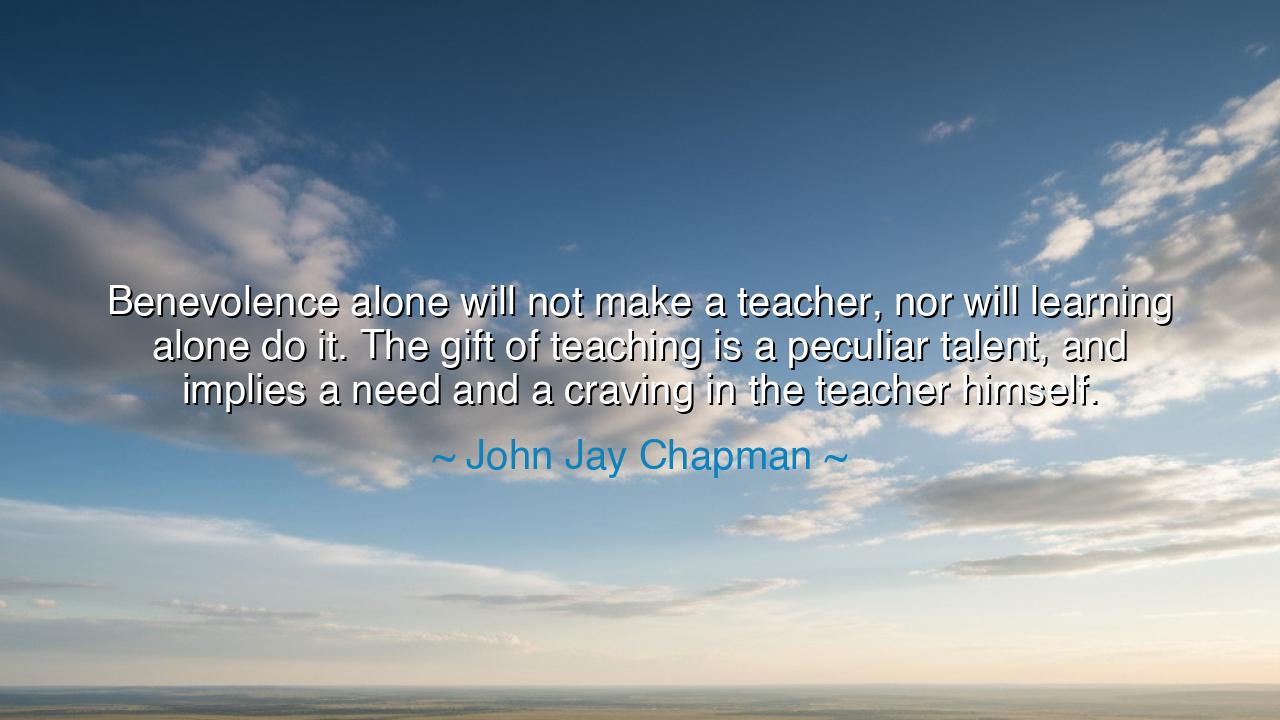
Benevolence alone will not make a teacher, nor will learning
Benevolence alone will not make a teacher, nor will learning alone do it. The gift of teaching is a peculiar talent, and implies a need and a craving in the teacher himself.






“Benevolence alone will not make a teacher, nor will learning alone do it. The gift of teaching is a peculiar talent, and implies a need and a craving in the teacher himself.” — John Jay Chapman
In this profound reflection, John Jay Chapman, the fiery American essayist and moral philosopher, lays bare the sacred mystery of the teaching spirit. His words speak not of mere profession, but of vocation — of a calling that burns within the heart like a divine fire. He reminds us that neither goodness alone, nor knowledge alone, makes one fit to teach. True teaching arises from a deeper hunger — a craving of the soul to awaken understanding in others, to share what has been hard-won through one’s own journey of discovery. The teacher, Chapman says, is not merely one who knows, but one who must give, for his wisdom becomes restless when it lies unspoken.
The origin of this truth lies in Chapman’s own life. Born into privilege yet driven by conscience, he was a man who sought integrity in all things. He knew scholars who were brilliant but cold, and philanthropists who were kind but shallow. Both, he saw, failed to kindle true transformation in others. For Chapman, the act of teaching was not a transaction of facts nor an act of charity — it was an act of creation, requiring both the light of knowledge and the fire of passion. To teach is to breathe life into another soul, and that breath must come from deep within. It is not enough to be wise; one must ache to see wisdom grow in another.
The ancients would have recognized this truth. The philosophers of Greece and the sages of the East alike knew that knowledge without love becomes sterile, and love without wisdom becomes blind. Socrates, that eternal midwife of the mind, did not instruct his pupils through lectures or commands — he taught through questions, through the art of awakening the learner’s own insight. His teaching was driven by an unquenchable need to search for truth, not only for himself but with others. He once said that the unexamined life is not worth living, but Chapman adds another dimension: that the unshared truth is not worth possessing. The teacher, then, is one who cannot help but share — compelled by love, bound by purpose, sustained by faith in the human mind’s power to grow.
Consider the example of Anne Sullivan, the devoted teacher of Helen Keller. Anne herself had known hardship and loss; she had lived in darkness both literal and emotional. Yet from her suffering grew a fierce compassion — a craving, as Chapman would say, to reach another soul trapped in silence. Her benevolence was immense, but it was not sentiment that made her great. Nor was it mere learning, though she was skilled and clever. What made her immortal was her relentless hunger to communicate — to draw out from Helen’s imprisoned mind the spark of awareness. When at last Helen felt the cool rush of water on her hand and understood the meaning of “w-a-t-e-r,” it was as if two souls had been reborn through one act of teaching. That moment embodies Chapman’s vision — teaching as a sacred necessity, born of inner fire.
In Chapman’s view, the gift of teaching is not learned; it is lived. It is not the mere passing of words, but the pouring out of the spirit. The true teacher is both artist and priest, shaping minds while ministering to hearts. He feels the need to teach as surely as the poet feels the need to write, or the singer to sing. To teach well, one must love truth and love others — but beyond even that, one must love the process of awakening itself. The teacher finds joy not in being admired, but in seeing understanding bloom in another’s eyes. He lives for that sacred exchange — the moment when confusion gives way to clarity, when darkness gives way to light.
Yet Chapman also warns us that such a calling demands sacrifice. The teacher gives much and often receives little. He must bear the weariness of repetition, the frustration of misunderstanding, the loneliness of seeing further than his pupils can yet see. But he endures, because within him burns that craving — that restless yearning to serve truth and nourish minds. He teaches not because it is easy, but because he cannot do otherwise. For him, teaching is not a duty, but destiny.
So, dear seeker, learn from this wisdom: if you would teach — whether in a classroom, in a home, or in the quiet example of your life — do not rely on benevolence or learning alone. Let your knowledge be guided by compassion, and your compassion be strengthened by knowledge. But above all, seek that inner hunger — that sacred need to share what is good, what is true, what is eternal. For only when you begin to crave the enlightenment of others as your own joy will you hold the true gift of teaching. And remember: the teacher’s work does not end when the lesson is done — it lives on, silently, in every heart that dares to think, to question, and to grow because of the fire you once kindled in their soul.






AAdministratorAdministrator
Welcome, honored guests. Please leave a comment, we will respond soon